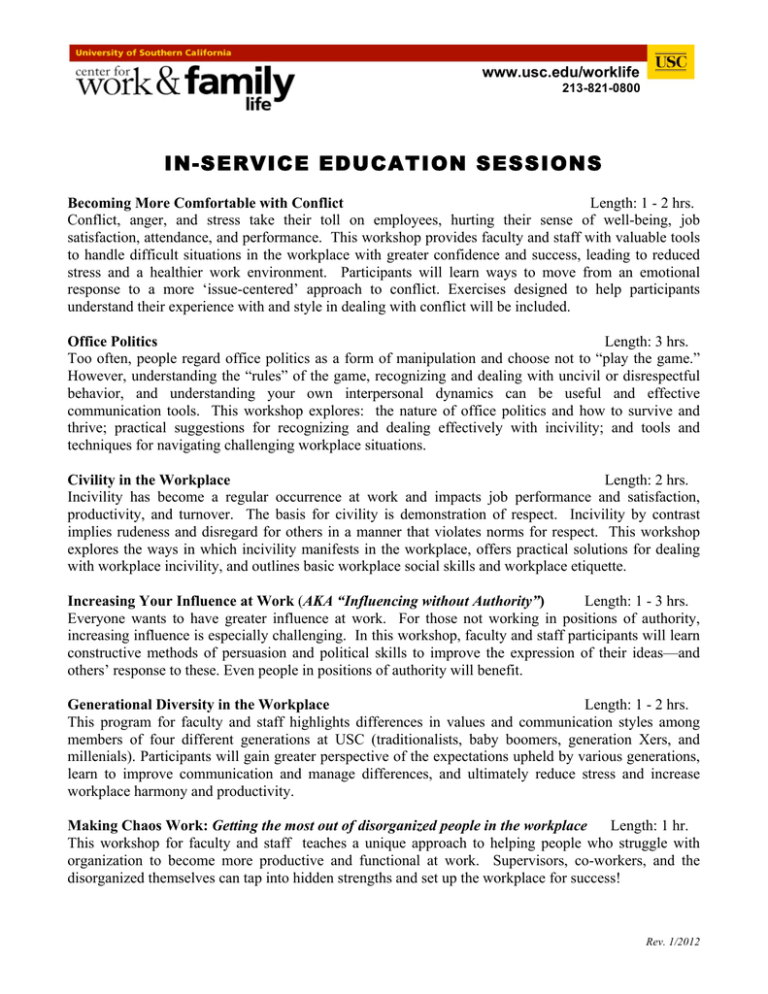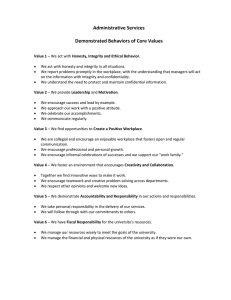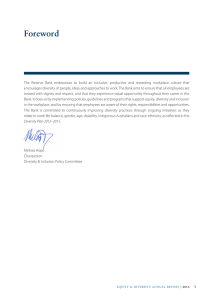IN-SERVICE EDUCATION SESSIONS
advertisement

www.usc.edu/worklife 213-821-0800 IN-SERVICE EDUCATION SESSIONS Becoming More Comfortable with Conflict Length: 1 - 2 hrs. Conflict, anger, and stress take their toll on employees, hurting their sense of well-being, job satisfaction, attendance, and performance. This workshop provides faculty and staff with valuable tools to handle difficult situations in the workplace with greater confidence and success, leading to reduced stress and a healthier work environment. Participants will learn ways to move from an emotional response to a more ‘issue-centered’ approach to conflict. Exercises designed to help participants understand their experience with and style in dealing with conflict will be included. Office Politics Length: 3 hrs. Too often, people regard office politics as a form of manipulation and choose not to “play the game.” However, understanding the “rules” of the game, recognizing and dealing with uncivil or disrespectful behavior, and understanding your own interpersonal dynamics can be useful and effective communication tools. This workshop explores: the nature of office politics and how to survive and thrive; practical suggestions for recognizing and dealing effectively with incivility; and tools and techniques for navigating challenging workplace situations. Civility in the Workplace Length: 2 hrs. Incivility has become a regular occurrence at work and impacts job performance and satisfaction, productivity, and turnover. The basis for civility is demonstration of respect. Incivility by contrast implies rudeness and disregard for others in a manner that violates norms for respect. This workshop explores the ways in which incivility manifests in the workplace, offers practical solutions for dealing with workplace incivility, and outlines basic workplace social skills and workplace etiquette. Increasing Your Influence at Work (AKA “Influencing without Authority”) Length: 1 - 3 hrs. Everyone wants to have greater influence at work. For those not working in positions of authority, increasing influence is especially challenging. In this workshop, faculty and staff participants will learn constructive methods of persuasion and political skills to improve the expression of their ideas—and others’ response to these. Even people in positions of authority will benefit. Generational Diversity in the Workplace Length: 1 - 2 hrs. This program for faculty and staff highlights differences in values and communication styles among members of four different generations at USC (traditionalists, baby boomers, generation Xers, and millenials). Participants will gain greater perspective of the expectations upheld by various generations, learn to improve communication and manage differences, and ultimately reduce stress and increase workplace harmony and productivity. Making Chaos Work: Getting the most out of disorganized people in the workplace Length: 1 hr. This workshop for faculty and staff teaches a unique approach to helping people who struggle with organization to become more productive and functional at work. Supervisors, co-workers, and the disorganized themselves can tap into hidden strengths and set up the workplace for success! Rev. 1/2012 www.usc.edu/worklife 213-821-0800 Supporting Colleagues in Times of Crisis Length: 1 hr. In the wake of a disaster, for every physical injury, there may be 5-6 psychological injuries. However, a mental health degree is not required to provide valuable support to people involved in traumatic situations. For anyone with the desire to help, this workshop teaches straightforward, manageable approaches to working with people in a crisis. Participants will learn the do’s and don’ts of psychological first aid to help others survive and recover from a major disaster or human tragedy. Understanding Personality Type as a Means to Improve Workplace Relationship* Length: 3 - 6 hrs. With an understanding of how different people prefer to use their minds, we can develop appropriate expectations based on specific personality differences. This understanding may allow us to work more constructively with people whose personality type is different from our own. In this interactive workshop you will: become familiar with personality type theory; understand the basic principles of the Myers-Briggs Type Indicator (MBTI®); take the MBTI to discover your own psychological-type; learn how different types perceive and interpret information and events; and discuss how an understanding of type differences can improve communication and reduce conflict at work. * A materials fee is charged for this session to cover the costs of assessments and workbooks. FOR FACULTY, MANAGERS AND SUPERVISORS Techniques for Dealing with Troubled Employees Length: 3 hrs. Managing the performance of employees can be a difficult and time-consuming task, even in ideal, uncomplicated situations. When an employee’s performance is impaired by personal or emotional problems, the management of job performance can become much more complex. This workshop will assist you to: identify an employee who may be experiencing personal problems; develop constructive approaches to confront employees with performance difficulties; understand the responsibilities and limitations of managers and supervisors; and effectively use the university’s employee assistance program and other consultative resources available to supervisors. Offering Constructive Criticism and Recognition Length: 1 hr. This course is designed for staff and faculty who supervise others. The presentation reviews the function and impact of constructive feedback as well as exploring free or inexpensive forms of recognition. Navigating the Whitewater: Constructive Approaches to Managing Change and Transitions Length: 2 hrs. Successful change requires the engagement and participation of the people involved. Change management provides a framework for managing the people side of change. Change management can be described as a systematic approach to dealing with change, both from the perspective of an organization and on the individual level. This workshop will provide insight into the stages of change, resistance to change, the meaning of endings and new beginnings, the role of control as well as the role of loss-both tangible and intangible, and how attitude, resilience and values impact our ability to successfully manage change. Rev. 1/2012 www.usc.edu/worklife 213-821-0800 Supporting Colleagues in Times of Crisis Length: 1 hr. In the wake of a disaster, for every physical injury, there may be 5-6 psychological injuries. However, a mental health degree is not required to provide valuable support to people involved in traumatic situations. For anyone with the desire to help, this workshop teaches straightforward, manageable approaches to working with people in a crisis. Participants will learn the do’s and don’ts of psychological first aid to help others survive and recover from a major disaster or human tragedy. Leading High Performance Teams: Creating Loyalty and Retention Through Employee Engagement Length: 90 mins. Employees who are highly committed to the work of your team will create more innovation, go the extra mile to contribute to the team’s success, and are less likely to leave. Managers can create an environment that promotes discretionary effort and talent retention by adopting an approach called “employee engagement.” This course will review the benefits of employee engagement efforts, and describe the manager characteristics that promote discretionary effort and employee retention. Dismissal with Dignity: Communicating and Implementing Reorganizations and Layoffs with Confidence and Compassion Length: 2 hrs. Telling an employee that he/she is going to be laid off likely ranks as one of the most difficult tasks a supervisor or manager has to face. A key consideration for management during these times is HOW to communicate this information – to those affected and to those remaining. Issues to be considered include preparation, delivery and recovery, as well as the personal responses of the manager him/herself. The Importance of Positive Emotions in the Workplace Length: 90 mins. Human beings are social animals and the workplace is a social context. Research and experience is clear that the best work product is achieved in the context of positive social relationships. Using research findings from the fields of business, social and neuroscience, this interactive session provides supervisors with a framework and suggestions for improving workplace human relations, which may translate into improved productivity, satisfaction and “pro-social” behaviors in the workplace. HEALTH AND WELLNESS TOOLS AND TECHNIQUES FOR COPING WITH STRESS Breathing: The Natural Tranquilizer Length: 1 hr. Breath is one key to health and relaxation, a natural function we can learn to regulate and develop in order to improve our ability to induce instant tranquility and relaxation with no side effects. In this ‘hands-on’ workshop, a specific breathing technique will be taught for use at both work and home. Using Meditation to Relax Length: Two 1 hr sessions spaced one week apart. Meditation is an effective technique used to relax the body and calm the mind. In this ‘hands on’ workshop, participants will learn and be able to apply this technique immediately for use at work or home. Rev. 1/2012 www.usc.edu/worklife 213-821-0800 Visualization and Progressive Relaxation Techniques Length: 1 hr. This hands-on workshop incorporates the use of all the senses to produce a visual effect that is so real and powerful that it transports participants to a place of total relaxation. Self-Hypnosis: Programming Your Mind for Positive Change Length: Two 1 hr sessions spaced one week apart. Hypnosis allows individuals to achieve a state of deep relaxation. In this state, your imagination can be used to make suggestions real giving you the ability to create new internal realities that can help you change negative habits, relax and make positive changes in your life. Stress Reduction Lab Overview Length: 1 hr. It’s no secret that too much stress can negatively impact health, productivity, and quality of life. The CWFL has created a set of tools and approaches to help faculty and staff manage their stress, and we call these our “Stress Reduction Lab.” In this workshop, participants will be familiarized with the Stress Reduction Lab and the computer-based biofeedback tool, the emWave, will be demonstrated. Offices and departments can also learn how to set up their own Stress Reduction Lab of onsite, allowing faculty and staff to have regular, local access to the program. Cognitive Behavioral Approaches to Stress Management Length: 2 - 4 hours. Many of us have deeply ingrained patterns of behavior that often make it difficult to consider different ways of approaching stressful circumstances in our lives. However, by altering your thoughts it may be possible to make significant, positive changes in your life. In this session, you will be informed about the cognitive-behavioral model used to identify your stress triggers and learn dynamic new ways of tackling them head on. Specific skills that are addressed include assertiveness, boundary setting, life balance, positive coping, and developing a healthy support network. Manage Your Energy Length: 90 minutes While time is a finite resource, energy is renewable. In this session, participants will learn to gain balance and identify specific strategies to increase mental, emotional, physical, and spiritual energy. This workshop will also help participants identify “energy leeches”, allowing them to preserve their energy and improve efficiency, productivity, and overall well-being. The Balancing Act: Doing Your Best at All Your Job Length: 2 – 6 hrs. Balancing work, family, and personal obligations is a challenge for all of us. This two-session program helps participants assess the degree of balance in their own lives and identify strategies for creating a healthier work/life balance. This workshop explores: values, roles and relationships, duties and responsibilities; effective ways to communicate individual needs, while defining what is most important, setting realistic boundaries; identifying unhealthy patterns and looking at new approaches to self-care. Creating Your Personal Work/Life Balance Plan Length: 1 hr. This brief workshop provides busy professionals with a quick way to create a personalized action plan for balance by looking at three key areas of their lives: self, career and family/friends. Rev. 1/2012 www.usc.edu/worklife 213-821-0800 Making Chaos Work: Getting the Most Out of Disorganized People in the Workplace Length: 1 hr. This workshop for faculty and staff teaches a unique approach to helping people who struggle with organization to become more productive and functional at work. Supervisors, co-workers, and the disorganized themselves can tap into hidden strengths and set up the workplace for success! Fresh Ways to Stress Less Length: 1 hr. Stress affects all of us in different ways. However, how we handle stress can affect our productivity and enjoyment of life. This one hour interactive group teaches participants creative and innovative ways to identify and cope with life’s stressors in an effective and positive manner. Sailing Through Your Next Performance Evaluation Length: 1 hr. This workshop is designed for staff and faculty who will receive feedback from their manager in an annual performance meeting. The speaker will prepare participants for a productive evaluation meeting that feels more like a dialogue than a confrontation, in order to better understand the manager’s goals for your development and thereby achieve greater success throughout the coming year. Finding Forgiveness Length: 1 hr. This course will provide concrete steps towards finding forgiveness, starting with self forgiveness skills and forgiveness in relationships. The session also explores the connection between lack of forgiveness and physical/ emotional stress. Participants will also learn the five steps to finding forgiveness, a four part model for “letting go” of grievances, and how to practice statements of self-forgiveness. Dealing with Difficult People Length: 1 – 2 hrs. We all encounter difficult people in our lives, but this can be especially challenging when these interactions occur in a workplace environment. This workshop will provide an identification and awareness of “difficult” personality types, help with developing coping strategies for personal success in communicating and engaging with these personality types, and reduce stress and personal investment in the negative feelings generated by conflict with difficult people. In addition, it will highlight issues, such as mental illness or substance abuse, to help you know when to seek support from a supervisor. Communicating More Effectively Length: 1- 2 hrs. It is easy to get frustrated when you cannot get your point across, feel misunderstood or are not being heard. By changing the way we communicate, we can make progress in improving our personal interactions and self-satisfaction. This workshop will help you understand your style of communication and examine whether it is working effectively for you, learn to set boundaries better, use strong emotions productively, identify anger triggers, and identify your locus of control. The Role of Work-Life Integration in Career Longevity Length: 1 hr. Originally created for our faculty physicians, this workshop reminds active professionals that practicing good balance between our work and personal lives now is a necessity for avoiding long term burnout and enjoying a lengthy and successful career. The workshop will define the two key measures of successful work-life balance, identify the common traps and barriers to work-life balance, and provide many several concrete and achievable solutions that will enhance and sustain work-life. Rev. 1/2012 www.usc.edu/worklife 213-821-0800 Avoiding Burnout Length: 1 hr. People commonly misuse the term ‘burnout’ to describe feelings of stress. Properly used, the term burnout refers to a progressive condition, which if left unaddressed, can lead to a profound sense of alienation, exhaustion and de-motivation. Learn how to identify symptoms of burnout and what you can do to mitigate or avoid this serious condition. Making Change Work for You Length: 1 – 3 hrs. Change can be difficult—often creating feelings of loss—but can also present opportunities. In this workshop, faculty and staff learn the risks of resisting or ignoring change, the process of transition, and the benefits of dealing with change proactively. Participants will also explore the three options when faced with change, and engage in exercises to help execute these options more effectively. Making Resolutions Stick: Setting SMART Goals Length: 1 hr. Only 75% of people maintain their New Year's resolutions past the first week. Do you REALLY want to lose weight, exercise more, or spend less this year? Join this workshop to learn more about the stages of change and how you can develop realistic goals to position yourself for resolutions that last. CWFL In-Service Education Sessions are provided to USC departments at no charge. All sessions are led by members of the Center for Work & Family Life’s professional staff. For more information or for customized consultation, please call John Gaspari or Linda Snouffer at 213-821-0800. Rev. 1/2012



